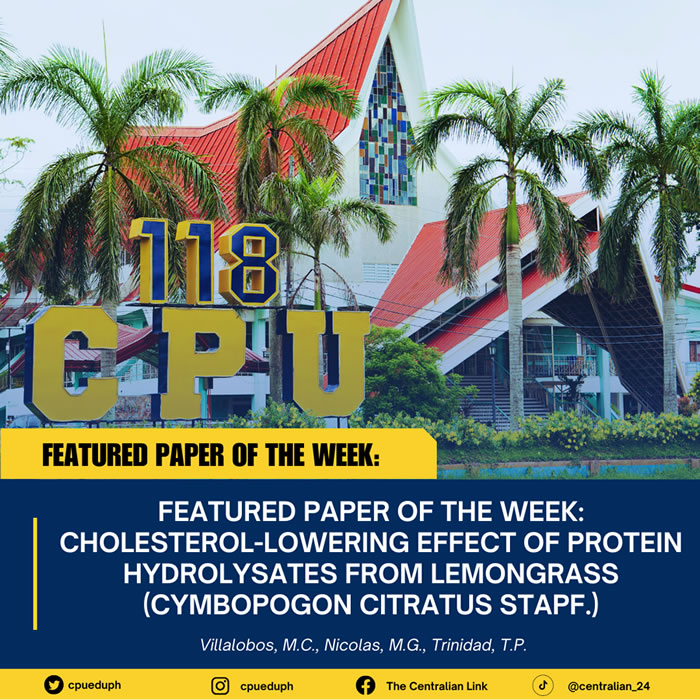Villalobos, M.C. (Chemistry Department, Ground Floor Roblee Science Hall, Central Philippine University, Iloilo City, Philippines), Nicolas, M.G. (Department of Physical Sciences and Mathematics, University of the Philippines Manila, Philippines), Trinidad, T.P. (The Graduate School, University of Santo Tomas España, Manila, Philippines)
Abstract
Lemongrass (Cymbopogon citratus Stapf.) has been used in the Philippines for cooking and as an herb to treat a variety of ailments including hypertension and related cardiovascular diseases (CVDs). This study determined the potential of peptides obtained from the hydrolysis of lemongrass proteins to lower cholesterol in vitro and in an animal model. Proteins were extracted and digested in vitro simulating gastrointestinal conditions. Protein hydrolysates were collected and fractionated using RP-SPE column, and assayed for HMG-CoA reductase inhibitory activity against pravastatin as a control drug. Tannin-free protein extract (TFPE) and total protein hydrolysates (TPC) were administered for two weeks to Sprague-Dawley rats maintained on a high-fat high-cholesterol diet. TFPE yield was 0.03%. Simulated gastrointestinal digestion of the TFPE resulted in 74% yield of protein hydrolysates. Three fractions were obtained from RP-SPE elution of the protein hydrolysates, each with potent HMG-CoA inhibitory activity. The F3 fraction had the highest inhibition of HMG-CoA reductase (IC50 = 0.76 ppm, comparable to pravastatin (IC50 = 0.25 ppm). The inhibitory activity of the fractions was further confirmed through significant serum cholesterol reduction (p < 0.05) in Sprague-Dawley rats. Thus, protein hydrolysates from lemongrass have potential cholesterol-lowering effects in vitro through HMG-CoA reductase inhibition and in vivo through significant reduction of cholesterol levels in an animal model. Protein hydrolysates from lemongrass dietary proteins may serve as promising functional foods for the prevention of CVD risk.
Keywords:
Cardiovascular Disease; Cholesterol-Lowering; Hypercholesterolemia; HMG-Coa Reductase; Simulated GI Digestion
Corresponding Author E-mail: mcvillalobos@cpu.edu.ph
To cite this article:
Villalobos M. C, Nicolas M. G, Trinidad T. P. Cholesterol-lowering Effect of Protein Hydrolysates from Lemongrass (Cymbopogon citratus Stapf.). Curr Res Nutr Food Sci 2023; 11(3). doi : http://dx.doi.org/10.12944/CRNFSJ.11.3.22
The publication is open access, allowing anyone to read the journal article.

